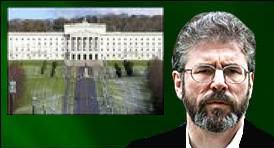
The Sinn Fein President Gerry Adams has branded as “totally and absolutely unacceptable” attempts by the DUP to attach the parades issue as a new condition to an agreed deal on policing.
DUP leader Peter Robinson told MPs at the London parliament of what he claimed was the “political imperative” to resolve issues of parading in the North ahead of any agreement.
Mr Robinson also called for the abolition of the Parades Commission, which is responsible for deciding the routes of sectarian parades. He branded it “not a solution to problems but part of the problem itself”.
On Thursday, Mr Adams said that Irish republicans accept and respect the rights of the anti-Catholic Orange Order to “parade and promote their sense of Orangeism” which he said was “part of who we are as a nation”.
“But this has to be done on the basis of equality and mutual respect and tolerance,” he added.
He said a deal on the devolution of policing and justice powers from London to the Belfast administration at Stormont had already been reached when the issue of sectarian marches was raised on Tuesday night.
He called on the Orange Order to engage in dialogue with local residents to resolve the remaining contentious parades.
“The Orange Order and Orangeism is part of who we are as a nation. Irish republicans want a dialogue with the loyal institutions in order that we can understand and appreciate each other’s position.”
“As a society, we cannot afford the negative and unsustainable political, financial and social costs that flow from parading disputes.
“While the overwhelming majority of orange parades take place without rancour or dispute, there are a small number each year which give cause for concern.
“I am again asking the Orange Order to engage in dialogue with local residents to resolve these contentious parades.
“Let us together seek to resolve this issue in a common sense and respectful manner.
Sinn Fein and the DUP have met to discuss the latest comments made by Mr Robinson.
Mr Adams has said the parades issue cannot now be mixed up with the policing and justice debate, on which he said agreement had already been reached.
“Has the deal been done?” he said.
“Yes. It was led by Martin McGuinness, but it involved the First Minister Peter Robinson - and Peter Robinson has signed on for that.
He said the future of the Parades Commission is “an issue which is distinctly separate and which will not be resolved as a precondition - it’s totally and absolutely unacceptable.”
Nevertheless, there are concerns that those nationalist communities which are forced to endure sectarian parades every summer could be sacrificed to appease the DUP hardliners.
Joe Marley, of the Ardoyne Parades Dialogue Group, said the recent clashes over sectarian Orange Order parades in north Belfast this year proved there was “a long way to go” before agreement on parading could be achieved.
He said a lasting settlement must “reflect the rights of residents to live free from fear of sectarian harassment”.
The Parades Commission’s “flawed decision making” in his community had “wrecked community confidence” among nationalists, he said.
“There is no consistency with determinations and no transparency with decision-making,” Mr Marley said.
The residents of the Garvaghy Road estate in Portadown fear a political manoeuvre could see the return of the infamous Drumcree march through the Catholic enclave and the march-related violence which blighted the town in the late ‘90s.
Breandan Mac Cionnaith from the Garvaghy Road Residents’ Coalition accused the DUP of playing the ‘Orange card’.
“The timing of the DUP’s present political offensive suggests that the DUP see the parades issue as some form of bargaining tool in the wider political arena,” he said.
He said the review of parading was unnecessary and unhelpful. In regard to Portadown, he said nationalists residents had moved on and would not accept any renewed bid to force a parade through their community.
The Drumcree issue was “one which belongs in the past and should remain there, and must not be allowed to be resurrected by anyone in order to suit party political agendas or narrow sectarian interests,” he said.
![[Irish Republican News]](https://republican-news.org/graphics/title_gifs/rn.gif)
![[Irish Republican News]](https://republican-news.org/graphics/title_gifs/harp.gif)

